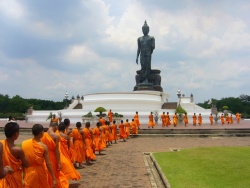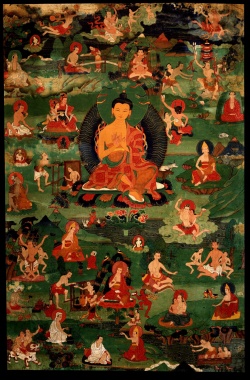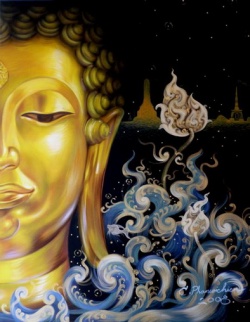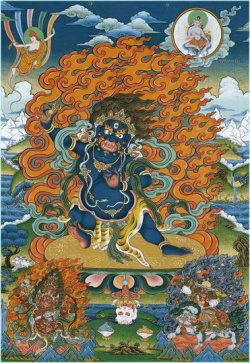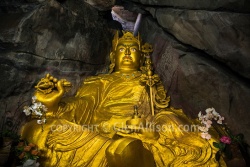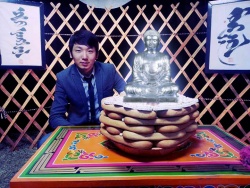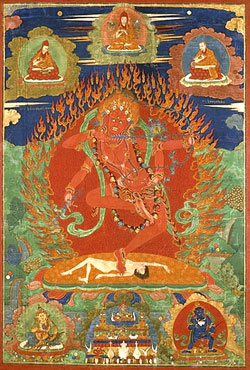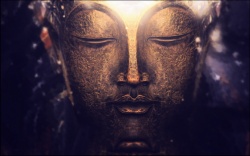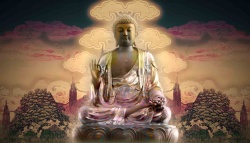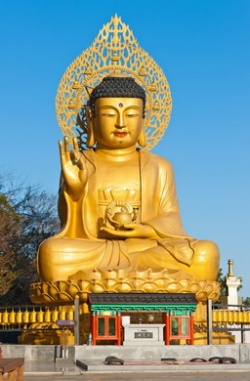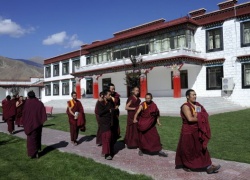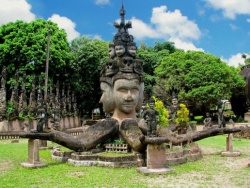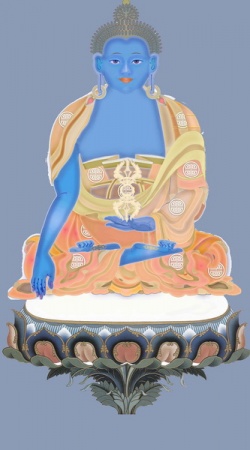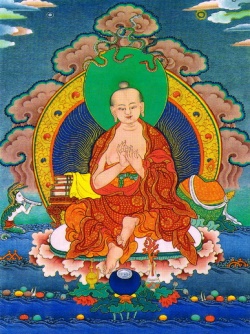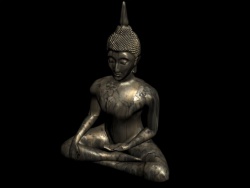Ānāpānasatisuttaṁ (MN 118): The Discourse about Mindfulness while Breathing
Ānāpānasatisuttaṁ [1](MN 118)
The Discourse about Mindfulness while Breathing
edited and translated by
Ānandajoti Bhikkhu
(September 2008)
Preface
Primary Texts
BJT: Śrī Laṁkan edition, from the Buddha Jayanti Tripitaka Series, Volume XII (Colombo, 1974/2517, reprinted with corrections 2005).
PTS: European edition, Majjhima-nikāya, Vol. III, (London 1899, reprinted Oxford, 1994).
Thai: Thai edition, as found on Budsir for Windows CD-ROM (version 2.0, Bangkok, 1996).
ChS: Burmese edition as found on the Chaṭṭha Saṅgāyana CD-ROM (version 3, Igaturi, no date but = 1999).
Commentaries
Pṭs: Paṭisambhidāmagga, (London, 1905 & 1907, reprinted Oxford, 1979).
Comm: Mahāparinibbānasuttavaṇṇanā, as found on the Chaṭṭha Saṅgāyana CD-ROM (version 3, Igatpuri, no date, but = 1999).
Vism: Visuddhimagga, as found on the Chaṭṭha Saṅgāyana CD-ROM (version 3, Igatpuri, no date, but = 1999).
Translations
MLD: Middle Length Discourse of the Buddha, translated by Bhikkhu Ñāṇamoli and Bhikkhu Bodhi (Wisdom Publications, 2001).
PD: The Path of Discrimination, translated by Ven. Ñāṇamoli (Oxford 1991).
PP: The Path of Purification, translated by Ven. Ñāṇamoli (Kandy, reprinted Taipei 2005).
Note
In writing up the notes to this translation I have preferred to rely on the Canonical Paṭisambhidāmagga wherever possible, and I have only used the commentarial aparratus where the former was lacking.
The intention has been to provide sufficient notes to explain my choice of readings and translation, and to expand on the doctrinal import of the discourse. The doctrinal notes need, however, to be supplemented by the notes to my translation of other discourses elsewhere on this website.
Ānandajoti Bhikkhu
October, 2008
The Setting
Evaṁ [2] me sutaṁ:
Thus I heard:
ekaṁ samayaṁ Bhagavā Sāvatthiyaṁ viharati
at one time the Gracious One was dwelling near Sāvatthī
Pubbārāme Migāramātupāsāde,
at Migāra's Mother's mansion in the Eastern Grounds, [3]
sambahulehi abhiññātehi abhiññātehi [4] Therehi Sāvakehi saddhiṁ
together with a great many very well-known Elder Disciples
āyasmatā ca Sāriputtena, [5] āyasmatā ca Mahāmoggallānena,
(such as) with venerable Sāriputta, with venerable Mahāmoggallāna,
āyasmatā ca Mahākassapena, āyasmatā ca Mahākaccāyanena,
with venerable Mahākassapa, with venerable Mahākaccāyana,
āyasmatā ca Mahākoṭṭhitena, āyasmatā ca Mahākappinena,
with venerable Mahākoṭṭhita, with venerable Mahākappina,
āyasmatā ca Mahācundena, āyasmatā ca Anuruddhena, [6]
with venerable Mahācunda, with venerable Anuruddha,
āyasmatā ca Revatena, āyasmatā ca Ānandena,
with venerable Revata, with venerable Ānanda,
aññehi ca abhiññātehi abhiññātehi Therehi Sāvakehi saddhiṁ.
together with other very well-known Elder Disciples.
The Training of the Monks
Tena kho pana samayena Therā bhikkhū nave bhikkhū [7] ovadanti anusāsanti.
Then at that time the Elder monks were advising and instructing the new monks. [8]
Appekacce Therā bhikkhū dasa pi bhikkhū ovadanti anusāsanti,
Some Elder monks were advising and instructing ten monks,
appekacce Therā bhikkhū vīsam-pi [9] bhikkhū ovadanti anusāsanti,
some Elder monks were advising and instructing twenty monks,
appekacce Therā bhikkhū tiṁsam-pi bhikkhū ovadanti anusāsanti,
some Elder monks were advising and instructing thirty monks,
appekacce Therā bhikkhū cattārīsam-pi [10] bhikkhū ovadanti anusāsanti,
some Elder monks were advising and instructing forty monks,
te ca navā bhikkhū Therehi bhikkhūhi ovadiyamānā anusāsiyamānā
and while those new monks were being advised and instructed by the Elder monks
uḷāraṁ [11] pubbenāparaṁ visesaṁ pajānanti. [12]
they came to know successive lofty attainments. [13]
Tena kho pana samayena Bhagavā Tad-ahuposathe pannarase, [14]
Then at that time the Gracious One, on that very Uposatha day of the fifteenth, [15]
Pavāraṇāya puṇṇāya puṇṇamāya rattiyā,
on the Pavāraṇā full moon night, [16]
Bhikkhusaṅghaparivuto abbhokāse nisinno hoti.
was sat in the open air surrounded by the Community of monks.
Atha kho Bhagavā,
Then the Gracious One,
tuṇhībhūtaṁ tuṇhībhūtaṁ [17] Bhikkhusaṅghaṁ anuviloketvā, bhikkhū āmantesi:
after seeing the community of monks were maintaining complete silence, addressed the monks (saying):
“Āraddhosmi bhikkhave imāya paṭipadāya,
“I am satisfied, [18] monks, with this practice,
āraddhacittosmi bhikkhave imāya paṭipadāya
my mind is satisfied with this practice,
tasmātiha bhikkhave bhiyyosomattāya viriyaṁ [19] ārabhatha
therefore, monks, put forth even more energy
appattassa pattiyā, anadhigatassa adhigamāya, asacchikatassa sacchikiriyāya,
for the attainment of the unattained, for the accomplishment of the unaccomplished, for the realisation of the unrealised, [20]
idhevāhaṁ Sāvatthiyaṁ Komudiṁ cātumāsiniṁ āgamissāmī.” ti [21]
I will be right here at Sāvatthī until the fourth month of Komudī comes.” [22]
Assosuṁ kho jānapadā bhikkhū:
The monks in the country heard:
“Bhagavā kira tattheva Sāvatthiyaṁ Komudiṁ cātumāsiniṁ āgamissatī,” ti
“The Gracious One will be right there at Sāvatthī until the fourth month of Komudī comes,”
te ca [23] jānapadā bhikkhū Sāvatthiṁ [24] osaranti Bhagavantaṁ dassanāya. [25]
and those monks in the country descended on Sāvatthī to see the Gracious One.
Te ca kho [26] Therā bhikkhū bhiyyosomattāya nave bhikkhū ovadanti anusāsanti,
Those Elder monks put forth even more energy advising and instructing the new monks,
appekacce Therā bhikkhū dasa pi bhikkhū ovadanti anusāsanti,
some Elder monks were advising and instructing ten monks,
appekacce Therā bhikkhū visam-pi bhikkhū ovadanti anusāsanti,
some Elder monks were advising and instructing twenty monks,
appekacce Therā bhikkhū tiṁsam-pi bhikkhū ovadanti anusāsanti,
some Elder monks were advising and instructing thirty monks,
appekacce Therā bhikkhū cattārīsam-pi bhikkhū ovadanti anusāsanti,
some Elder monks were advising and instructing forty monks,
te ca navā bhikkhū therehi bhikkhūhi ovadiyamānā anusāsiyamānā
and while those new monks were being advised and instructed by the Elder monks
uḷāraṁ pubbenāparaṁ visesaṁ pajānanti.
they came to know (even more) successive lofty attainments.
Tena kho pana samayena Bhagavā Tad-ahuposathe pannarase,
Then at that time the Gracious One, on that very Uposatha day of the fifteenth,
Komudiyā cātumāsiniyā puṇṇāya puṇṇamāya rattiyā,
on the Komudī full moon night at the end of four months,
Bhikkhusaṅghaparivuto abbhokāse nisinno hoti.
was sat in the open air surrounded by the Community of monks.
Atha kho Bhagavā
Then the Gracious One,
tuṇhībhūtaṁ tuṇhibhūtaṁ Bhikkhusaṅghaṁ anuviloketvā bhikkhū āmantesi:
after seeing the community of monks were maintaining complete silence, addressed the monks (saying):
“Apalāpāyaṁ bhikkhave parisā; nippalāpāyaṁ bhikkhave parisā,
“The assembly, monks, is without frivolous speech; the assembly, monks, is free from frivolous speech,
suddhā sāre [27] patiṭṭhitā.
it is solely established in the essential.
Tathārūpo ayaṁ bhikkhave Bhikkhusaṅgho, tathārūpāyaṁ [28] bhikkhave parisā,
Such, monks, is this Community of monks, such, monks, is this assembly,
yathārūpā parisā āhuneyyā pāhuneyyā dakkhiṇeyyā añjalikaraṇīyā, [29]
and the assembly is worthy of offerings, of hospitality, of gifts, and of reverential salutation,
anuttaraṁ puññakkhettaṁ lokassa. [30]
it is an unsurpassed field of merit for the world. [31]
Tathārūpo ayaṁ bhikkhave Bhikkhusaṅgho, tathārūpāyaṁ bhikkhave parisā,
Such, monks, is this Community of monks, such, monks, is this assembly,
yathārūpāya parisāya appaṁ dinnaṁ bahuṁ [32] hoti,
and giving a little gift to the assembly produces a great amount (of merit),
bahuṁ dinnaṁ bahutaraṁ.
and a great gift (produces) an even greater amount.
Tathārūpo ayaṁ bhikkhave Bhikkhusaṅgho, tathārūpāyaṁ bhikkhave parisā,
Such, monks, is this Community of monks, such, monks, is this assembly,
yathārūpā parisā dullabhā dassanāya lokassa.
and the assembly is rare to see in the world.
Tathārūpo ayaṁ bhikkhave Bhikkhusaṅgho, tathārūpāyaṁ bhikkhave parisā,
Such, monks, is this Community of monks, such, monks, is this assembly,
yathārūpaṁ parisaṁ alaṁ yojanagaṇanāni dassanāya gantuṁ puṭosenāpi. [33]
and it is suitable to go many leagues, even with a bag of provisions, to see this assembly. [34]
Noble Persons
Santi [35] bhikkhave bhikkhū imasmiṁ Bhikkhusaṅghe
Monks, there are monks in this Community of monks
Arahanto khīṇāsavā vusitavanto katakaraṇīyā,
who are Worthy, without pollutants, who have done what ought to be done,
ohitabhārā anuppattasadatthā
who have put down the burden, reached their goal,
parikkhīṇabhavasaññojanā [36] sammad-aññā vimuttā:
destroyed the fetters that lead to continuation (of existence), who through final knowledge are free:
evarūpā pi bhikkhave santi bhikkhū imasmiṁ Bhikkhusaṅghe.
monks, there are such monks in this Community of monks. [37]
Santi bhikkhave bhikkhū imasmiṁ Bhikkhusaṅghe
Monks, there are monks in this Community of monks
pañcannaṁ orambhāgiyānaṁ saññojanānaṁ parikkhayā,
who, through the complete destruction of the five lower fetters,
opapātikā tattha parinibbāyino anāvattidhammā tasmā lokā:
will arisen spontaneously (in the Brahmā worlds), and will attain Final Emancipation there, without returning from that world:
evarūpā pi bhikkhave santi bhikkhū imasmiṁ Bhikkhusaṅghe.
monks, there are such monks in this Community of monks.
Santi bhikkhave bhikkhū imasmiṁ [38] Bhikkhusaṅghe
Monks, there are monks in this Community of monks
tiṇṇaṁ saññojanānaṁ parikkhayā,
who, through the complete destruction of three fetters,
rāgadosamohānaṁ tanuttā,
and the diminuation of passion, hatred, and delusion,
Sakadāgāmino sakid-eva imaṁ lokaṁ āgantvā dukkhassantaṁ karissanti:
are Once-Returners, and will return only once more to this world, and (then) will make an end to suffering:
evarūpā pi bhikkhave santi bhikkhū imasmiṁ Bhikkhusaṅghe.
monks, there are such monks in this Community of monks.
Santi bhikkhave bhikkhū imasmiṁ Bhikkhusaṅghe
Monks, there are monks in this Community of monks
tiṇṇaṁ saññojanānaṁ parikkhayā,
who, through the complete destruction of three fetters,
Sotāpannā avinipātadhammā niyatā sambodhiparāyanā: [39]
are Stream-Enterers, no longer subject to falling (into the lower realms), and have a fixed destiny ending in Final Awakening:
evarūpā pi bhikkhave santi bhikkhū imasmiṁ Bhikkhusaṅghe.
monks, there are such monks in this Community of monks.
Monks Practising the 37 Things on the Side of Awakening
Santi bhikkhave bhikkhū imasmiṁ Bhikkhusaṅghe
Monks, there are monks in this Community of monks
Catunnaṁ Satipaṭṭhānānaṁ bhāvanānuyogam-anuyuttā viharanti:
who live engaged in and devoted to the development of the Four Ways of Attending to Mindfulness: [40]
evarūpā pi bhikkhave santi bhikkhū imasmiṁ Bhikkhusaṅghe.
monks, there are such monks in this Community of monks. [41]
Santi bhikkhave bhikkhū imasmiṁ Bhikkhusaṅghe
Monks, there are monks in this Community of monks
Catunnaṁ Sammappadhānānaṁ bhāvanānuyogam-anuyuttā viharanti:
who live engaged in and devoted to the development of the Four Right Strivings: [42]
evarūpā pi bhikkhave santi bhikkhū imasmiṁ Bhikkhusaṅghe.
monks, there are such monks in this Community of monks.
Santi bhikkhave bhikkhū imasmiṁ Bhikkhusaṅghe
Monks, there are monks in this Community of monks
Catunnaṁ Iddhipādānaṁ [43] bhāvanānuyogam-anuyuttā viharanti:
who live engaged in and devoted to the development of the Four Paths to Power: [44]
evarūpā pi bhikkhave santi bhikkhū imasmiṁ Bhikkhusaṅghe.
monks, there are such monks in this Community of monks.
Santi bhikkhave bhikkhū imasmiṁ Bhikkhusaṅghe
Monks, there are monks in this Community of monks
Pañcannaṁ Indriyānaṁ bhāvanānuyogam-anuyuttā viharanti:
who live engaged in and devoted to the development of the Five Faculties: [45]
evarūpā pi bhikkhave santi bhikkhū imasmiṁ Bhikkhusaṅghe.
monks, there are such monks in this Community of monks.
Santi bhikkhave bhikkhū imasmiṁ Bhikkhusaṅghe
Monks, there are monks in this Community of monks
Pañcannaṁ Balānaṁ bhāvanānuyogam-anuyuttā viharanti:
who live engaged in and devoted to the development of the Five Strengths: [46]
evarūpā pi bhikkhave santi bhikkhū imasmiṁ Bhikkhusaṅghe.
monks, there are such monks in this Community of monks.
Santi bhikkhave bhikkhū imasmiṁ Bhikkhusaṅghe
Monks, there are monks in this Community of monks
Sattannaṁ [47] Bojjhaṅgānaṁ bhāvanānuyegamayuttā viharanti:
who live engaged in and devoted to the development of the Seven Factors of Awakening: [48]
evarūpā pi bhikkhave santi bhikkhū imasmiṁ Bhikkhusaṅghe.
monks, there are such monks in this Community of monks.
Santi bhikkhave bhikkhū imasmiṁ Bhikkhusaṅghe
Monks, there are monks in this Community of monks
Ariyassa Aṭṭhaṅgikassa Maggassa bhāvanānuyogam-anuyuttā viharanti:
who live engaged in and devoted to the development of the Noble Eight-Fold Path: [49]
evarūpā pi bhikkhave santi bhikkhū imasmiṁ Bhikkhusaṅghe.
monks, there are such monks in this Community of monks.
Six further meditations [50]
Santi bhikkhave bhikkhū imasmiṁ Bhikkhusaṅghe
Monks, there are monks in this Community of monks
mettābhāvanānuyogam-anuyuttā viharanti:
who live engaged in and devoted to the development of the meditation that is friendliness: [51]
evarūpā pi bhikkhave santi bhikkhū imasmiṁ Bhikkhusaṅghe.
monks, there are such monks in this Community of monks.
Santi bhikkhave bhikkhū imasmiṁ Bhikkhusaṅghe
Monks, there are monks in this Community of monks
karuṇābhāvanānuyogam-anuyuttā [52] viharanti:
who live engaged in and devoted to the development of the meditation that is kindness: [53]
evarūpā pi bhikkhave santi bhikkhū imasmiṁ Bhikkhusaṅghe.
monks, there are such monks in this Community of monks.
Santi bhikkhave bhikkhū imasmiṁ Bhikkhusaṅghe
Monks, there are monks in this Community of monks
muditābhāvanānuyogam-anuyuttā viharanti:
who live engaged in and devoted to the development of the meditation that is gladness: [54]
evarūpā pi bhikkhave santi bhikkhū imasmiṁ Bhikkhusaṅghe.
monks, there are such monks in this Community of monks.
Santi bhikkhave bhikkhū imasmiṁ Bhikkhusaṅghe
Monks, there are monks in this Community of monks
upekkhābhāvanānuyogam-anuyuttā [55] viharanti:
who live engaged in and devoted to the development of the meditation that is equanimity: [56]
evarūpā pi bhikkhave santi bhikkhū imasmiṁ Bhikkhusaṅghe.
monks, there are such monks in this Community of monks.
Santi bhikkhave bhikkhū imasmiṁ Bhikkhusaṅghe
Monks, there are monks in this Community of monks
asubhabhāvanānuyogam-anuyuttā viharanti:
who live engaged in and devoted to the development of the meditation on the unattractive:
evarūpā pi bhikkhave santi bhikkhū imasmiṁ Bhikkhusaṅghe.
monks, there are such monks in this Community of monks.
Santi bhikkhave bhikkhū imasmiṁ Bhikkhusaṅghe
Monks, there are monks in this Community of monks
aniccasaññābhāvanānuyogam-anuyuttā viharanti:
who live engaged in and devoted to the development of the meditation that is the perception of impermanence:
evarūpā pi bhikkhave santi bhikkhū imasmiṁ Bhikkhusaṅghe.
monks, there are such monks in this Community of monks.
Mindfulness while Breathing
Santi bhikkhave bhikkhū imasmiṁ Bhikkhusaṅghe
Monks, there are monks in this Community of monks
ānāpānasatibhāvanānuyogam-anuyuttā viharanti.
who live engaged in and devoted to the development of the meditation of mindfulness while breathing.
Ānāpānasati bhikkhave bhāvitā bahulīkatā mahapphalā hoti mahānisaṁsā.
Mindfulness while breathing, monks, when it has been developed and made much of yields great fruit and brings great advantages.
Ānāpānasati bhikkhave bhāvitā bahulīkatā Cattāro Satipaṭṭhāne paripūrenti, [57]
Mindfulness while breathing, monks, when it has been developed and made much of fulfils the Four Ways of Attending to Mindfulness,
Cattāro Satipaṭṭhānā bhāvitā bahulīkatā Satta Bojjhaṅge paripūrenti,
the Four Ways of Attending to Mindfulness when they have been developed and made much of fulfil the Seven Factors of Awakening,
Satta Bojjhaṅgā bhāvitā bahulīkatā Vijjāvimuttiṁ paripūrenti.
the Seven Factors of Awakening when they have been developed and made much of fulfil Knowledge and Freedom.
Kathaṁ bhāvitā ca bhikkhave ānāpānasati?
And how, monks, is mindfulness while breathing developed?
Kathaṁ bahulīkatā mahapphalā hoti mahānisaṁsā?
How, when it has been made much of, does it yield great fruit and bring great advantages?
Preliminaries
Idha bhikkhave bhikkhu araññagato vā, rukkhamūlagato vā,
Here, [58] monks, a monk who has gone to the wilderness, or to the root of a tree,
suññāgāragato vā, nisīdati.
or to an empty place, sits down.
Pallaṅkaṁ ābhujitvā, ujuṁ kāyaṁ paṇidhāya,
After folding his legs crosswise, setting his body straight,
parimukhaṁ satiṁ upaṭṭhapetvā,
and establishing mindfulness at the front,
so sato va assasati, sato [59] passasati.
ever mindful he breathes in, mindful he breathes out. [60]
Mindfulness of the Body
Dīghaṁ vā assasanto “dīghaṁ assasāmī” ti pajānāti,
While breathing in long, he knows “I am breathing in long”, [61]
dīghaṁ vā passasanto “dīghaṁ passasāmī” ti pajānāti,
while breathing out long, he knows “I am breathing out long”, [62]
rassaṁ vā assasanto “rassaṁ assasāmī” ti pajānāti,
while breathing in short, he knows “I am breathing in short”,
rassaṁ vā passasanto “rassaṁ passasāmī” ti pajānāti,
while breathing out short, he knows “I am breathing out short”,
sabbakāyapaṭisaṁvedī assasissāmī ti sikkhati,
he trains like this: experiencing the whole body I will breathe in, [63]
sabbakāyapaṭisaṁvedī passasissāmī ti sikkhati,
he trains like this: experiencing the whole body I will breathe out, [64]
passambhayaṁ kāyasaṅkhāraṁ assasissāmī ti sikkhati,
he trains like this: making the bodily process calm I will breathe in, [65]
passambhayaṁ kāyasaṅkhāraṁ passasissāmī ti sikkhati.
he trains like this: making the bodily process calm I will breathe out.
Mindfulness of Feelings
Pītipaṭisaṁvedī assasissāmī ti sikkhati,
He trains like this: experiencing joy I will breathe in,
pītipaṭisaṁvedī [66] passasissāmī ti sikkhati,
he trains like this: experiencing joy I will breathe out, [67]
sukhapaṭisaṁvedī assasissāmī ti sikkhati,
he trains like this: experiencing pleasure I will breathe in,
sukhapaṭisaṁvedī passasissāmī ti sikkhati,
he trains like this: experiencing pleasure I will breathe out, [68]
cittasaṅkhārapaṭisaṁvedī assasissāmī ti sikkhati,
he trains like this: experiencing the mental process I will breathe in,
cittasaṅkhārapaṭisaṁvedī passasissāmī ti sikkhati,
he trains like this: experiencing the mental process I will breathe out, [69]
passambhayaṁ cittasaṅkhāraṁ assasissāmī ti sikkhati,
he trains like this: making the mental process calm I will breathe in,
passambhayaṁ cittasaṅkhāraṁ passasissāmī ti sikkhati.
he trains like this: making the mental process calm I will breathe out.
Mindfulness of the Mind
Cittapaṭisaṁvedī assasissāmī ti sikkhati,
He trains like this: experiencing the mind I will breathe in,
cittapaṭisaṁvedī passasissāmī ti sikkhati,
he trains like this: experiencing the mind I will breathe out, [70]
abhippamodayaṁ cittaṁ assasissāmī ti sikkhati,
he trains like this: gladdening the mind I will breathe in,
abhippamodayaṁ cittaṁ passasissāmī ti sikkhati,
he trains like this: gladdening the mind I will breathe out, [71]
samādahaṁ cittaṁ assasissāmī ti sikkhati,
he trains like this: concentrating the mind I will breathe in,
samādahaṁ cittaṁ passasissāmī ti sikkhati,
he trains like this: concentrating the mind I will breathe out, [72]
vimocayaṁ cittaṁ assasissāmī ti sikkhati,
he trains like this: freeing the mind I will breathe in,
vimocayaṁ cittaṁ passasissāmī ti sikkhati.
he trains like this: freeing the mind I will breathe out. [73]
Mindfulness of (the Nature of) Things
Aniccānupassī assasissāmī ti sikkhati,
He trains like this: contemplating impermanence I will breathe in,
aniccānupassī passasissāmī ti sikkhati,
he trains like this: contemplating impermanence I will breathe out, [74]
virāgānupassī assasissāmī ti sikkhati,
he trains like this: contemplating dispassion I will breathe in,
virāgānupassī passasissāmī ti sikkhati,
he trains like this: contemplating dispassion I will breathe out, [75]
nirodhānupassī assasissāmī ti sikkhati,
he trains like this: contemplating cessation I will breathe in,
nirodhānupassī passasissāmī ti sikkhati,
he trains like this: contemplating cessation I will breathe out,
paṭinissaggānupassī assasissāmī ti sikkhati,
he trains like this: contemplating letting go I will breathe in,
paṭinissaggānupassī passasissāmī ti sikkhati.
he trains like this: contemplating letting go I will breathe out. [76]
Evaṁ bhāvitā kho bhikkhave ānāpānasati.
Like this, monks, is mindfulness while breathing developed.
Evaṁ bahulīkatā mahapphalā hoti mahānisaṁsā.
Like this, when it has been made much of, it yields great fruit and brings great advantages.
Fulfillment of Mindfulness
Fulfillment of Mindfulness of the Body
Kathaṁ bhāvitā ca bhikkhave ānāpānasati? And how, monks, is mindfulness while breathing developed?
Kathaṁ bahulikatā Cattāro Satipaṭṭhāne paripūrenti? How, when made much of, does it fulfil the Four Ways of Attending to Mindfulness?
Yasmiṁ samaye bhikkhave bhikkhu, Monks, a monk who, at whatever time,
dīghaṁ vā assasanto “dīghaṁ assasāmī” ti pajānāti, while breathing in long, knows “I am breathing in long”,
dīghaṁ vā passasanto “dīghaṁ passasāmī” ti pajānāti, while breathing out long, knows “I am breathing out long”,
rassaṁ vā assasanto “rassaṁ assasāmī” ti pajānāti, while breathing in short, knows “I am breathing in short”,
rassaṁ vā passasanto “rassaṁ passasāmī” ti pajānāti, while breathing out short, knows “I am breathing out short”,
sabbakāyapaṭisaṁvedī assasissāmī ti sikkhati, trains like this: experiencing the whole body I will breathe in,
sabbakāyapaṭisaṁvedī passasissāmī ti sikkhati, trains like this: experiencing the whole body I will breathe out,
passambhayaṁ kāyasaṅkhāraṁ assasissāmī ti sikkhati, trains like this: making the bodily process calm I will breathe in,
passambhayaṁ kāyasaṅkhāraṁ passasissāmī ti sikkhati, trains like this: making the bodily process calm I will breathe out,
kāye kāyānupassī bhikkhave tasmiṁ samaye bhikkhu viharati, at that time, monks, a monk lives contemplating (the nature of) the body in the body, [77]
ātāpī sampajāno satimā, vineyya loke abhijjhādomanassaṁ. ardent, fully aware, and mindful, after removing avarice and sorrow regarding the world. [78]
Kāyesu kāyaññatarāhaṁ bhikkhave etaṁ vadāmi yad-idaṁ: assāsapassāsā, [79] I say, monks, that this is a certain kind of body amongst the bodies, namely: breathing,
tasmātiha bhikkhave kāye kāyānupassī tasmiṁ samaye bhikkhu viharati, therefore, monks, at that time a monk lives contemplating (the nature of) the body in the body,
ātāpī sampajāno satimā, vineyya loke abhijjhādomanassaṁ. ardent, fully aware, and mindful, after removing avarice and sorrow regarding the world. </poem>
Fulfillment of Mindfulness of the Feelings
Yasmiṁ samaye bhikkhave bhikkhu,
Monks, a monk who, at whatever time,
pītipaṭisaṁvedī assasissāmī ti sikkhati,
trains like this: experiencing joy I will breathe in,
pītipaṭisaṁvedī passasissāmī ti sikkhati,
trains like this: experiencing joy I will breathe out,
sukhapaṭisaṁvedī assasissāmī ti sikkhati,
trains like this: experiencing pleasure I will breathe in,
sukhapaṭisaṁvedī passasissāmī ti sikkhati,
trains like this: experiencing pleasure I will breathe out,
cittasaṅkhārapaṭisaṁvedī assasissāmī ti sikkhati,
trains like this: experiencing the mental process I will breathe in,
cittasaṅkhārapaṭisaṁvedī passasissāmī ti sikkhati,
trains like this: experiencing the mental process I will breathe out,
passambhayaṁ cittasaṅkhāraṁ assasissāmī ti sikkhati,
trains like this: making the mental process calm I will breathe in,
passambhayaṁ cittasaṅkhāraṁ passasissāmī ti sikkhati,
trains like this: making the mental process calm I will breathe out,
vedanāsu vedanānupassī bhikkhave tasmiṁ samaye bhikkhu viharati,
at that time, monks, a monk lives contemplating (the nature of) the feelings in feelings,
ātāpī sampajāno satimā, vineyya loke abhijjhādomanassaṁ.
ardent, fully aware, and mindful, after removing avarice and sorrow regarding the world.
Vedanāsu vedanaññatarāhaṁ [80] bhikkhave etaṁ vadāmi yad-idaṁ:
I say, monks, that this is a certain feeling amongst the feelings, namely:
assāsapassāsānaṁ sādhukaṁ manasikāraṁ,
applying the mind well to the breathing, [81]
tasmātiha bhikkhave vedanāsu vedanānupassī tasmiṁ samaye bhikkhu viharati,
therefore, monks, at that time a monk lives contemplating (the nature of) the feelings in the feelings,
ātāpī sampajāno satimā, vineyya loke abhijjhādomanassaṁ
ardent, fully aware, and mindful, after removing avarice and sorrow regarding the world.
Fulfillment of Mindfulness of the Mind
Yasmiṁ samaye bhikkhave bhikkhu,
Monks, a monk who, at whatever time,
cittapaṭisaṁvedī assasissāmī ti sikkhati,
trains like this: experiencing the mind I will breathe in,
cittapaṭisaṁvedī passasissāmī ti sikkhati,
trains like this: experiencing the mind I will breathe out,
abhippamodayaṁ cittaṁ assasissāmī ti sikkhati,
trains like this: gladdening the mind I will breathe in,
abhippamodayaṁ cittaṁ passasissāmī ti sikkhati,
trains like this: gladdening the mind I will breathe out,
samādahaṁ cittaṁ assasissāmī ti sikkhati,
trains like this: concentrating the mind I will breathe in,
samādahaṁ cittaṁ passasissāmī ti sikkhati,
trains like this: concentrating the mind I will breathe out,
vimocayaṁ cittaṁ assasissāmī ti sikkhati,
trains like this: freeing the mind I will breathe in,
vimocayaṁ cittaṁ passasissāmī ti sikkhati,
trains like this: freeing the mind I will breathe out,
citte cittānupassī bhikkhave tasmiṁ samaye bhikkhu viharati
at that time, monks, a monk lives contemplating (the nature of) the mind in the mind,
ātāpī sampajāno satimā, vineyya loke abhijjhādomanassaṁ.
ardent, fully aware, and mindful, after removing avarice and sorrow regarding the world.
Nāhaṁ bhikkhave muṭṭhassatissa [82] asampajānassa ānāpānasatibhāvanaṁ [83] vadāmi,
I do not say, monks, of one who has lost mindfulness, who does not have full knowledge, that he has developed mindfulness of breathing, [84]
tasmātiha bhikkhave citte cittānupassī tasmiṁ samaye bhikkhu viharati
therefore, monks, at that time a monk lives contemplating (the nature of) the mind in the mind,
ātāpī sampajāno satimā, vineyya loke abhijjhādomanassaṁ.
ardent, fully aware, and mindful, after removing avarice and sorrow regarding the world.
Fulfillment of Mindfulness of (the Nature of) Things
Yasmiṁ samaye bhikkhave bhikkhu,
Monks, a monk who, at whatever time,
aniccānupassī assasissāmī ti sikkhati,
trains like this: contemplating impermanence I will breathe in,
aniccānupassī passasissāmī ti sikkhati,
trains like this: contemplating impermanence I will breathe out,
virāgānupassī assasissāmī ti sikkhati,
trains like this: contemplating dispassion I will breathe in,
virāgānupassī passasissāmī ti sikkhati,
trains like this: contemplating dispassion I will breathe out,
nirodhānupassī assasissāmī ti sikkhati,
trains like this: contemplating cessation I will breathe in,
nirodhānupassī passasissāmī ti sikkhati, [85]
trains like this: contemplating cessation I will breathe out,
paṭinissaggānupassī assasissāmī ti sikkhati,
trains like this: contemplating letting go I will breathe in,
paṭinissaggānupassī passasissāmī ti sikkhati,
trains like this: contemplating letting go I will breathe out,
dhammesu dhammānupassī bhikkhave tasmiṁ samaye bhikkhu viharati
at that time, monks, a monk lives contemplating (the nature of) things in (various) things,
ātāpī sampajāno satimā, vineyya loke abhijjhādomanassaṁ.
ardent, fully aware, and mindful, after removing avarice and sorrow regarding the world.
So yaṁ taṁ [86] abhijjhādomanassānaṁ pahānaṁ taṁ [87] paññāya disvā,
Having seen with wisdom the giving up of whatever avarice and sorrow there is,
sādhukaṁ ajjhupekkhitā hoti,
he is completely equanimous, [88]
tasmātiha bhikkhave dhammesu dhammānupassī tasmiṁ samaye bhikkhu viharati
therefore, monks, at that time a monk lives contemplating (the nature of) things in (various) things,
ātāpī sampajāno satimā, vineyya loke abhijjhādomanassaṁ.
ardent, fully aware, and mindful, after removing avarice and sorrow regarding the world.
Evaṁ bhāvitā kho bhikkhave ānāpānasati.
Like this, monks, mindfulness while breathing is developed.
Evaṁ bahulīkatā Cattāro Satipaṭṭhāne paripūrenti.
Like this, when it has been made much of, it fulfils the Four Ways of Attending to Mindfulness.
Fulfillment of the Factors of Complete Awakening through Contemplation of the Body
Kathaṁ bhāvitā ca bhikkhave Cattāro Satipaṭṭhānā? And how, monks, are the Four Ways of Attending to Mindfulness developed?
Kathaṁ bahulīkatā Satta Bojjhaṅge paripūrenti? How, when made much of, do they fulfil the Seven Factors of Awakening?
Fulfillment of the Mindfulness Factor of Awakening
Yasmiṁ samaye bhikkhave bhikkhu, kāye kāyānupassī viharati, Monks, a monk who, at whatever time, dwells contemplating (the nature of) the body in the body,
ātāpī sampajāno satimā, vineyya loke abhijjhādomanassaṁ, ardent, fully aware, and mindful, after removing avarice and sorrow regarding the world,
upaṭṭhitassa [89] tasmiṁ samaye sati hoti asammuṭṭhā, [90] at that time has mindfulness established and he is not forgetful,
yasmiṁ samaye bhikkhave and monks, at whatever time
bhikkhuno upaṭṭhitā sati hoti asammuṭṭhā, a monk's mindfulness is established and he is not forgetful,
Satisambojjhaṅgo tasmiṁ samaye bhikkhuno āraddho hoti, at that time the Mindfulness Factor of Complete Awakening has been undertaken for that monk,
Satisambojjhaṅgaṁ tasmiṁ samaye bhikkhu bhāveti, at that time that monk is developing the Mindfulness Factor of Complete Awakening,
Satisambojjhaṅgo tasmiṁ samaye bhikkhuno at that time that monk's Mindfulness Factor of Complete Awakening
bhāvanāpāripūriṁ gacchati. is developing and heading towards fulfilment. </poem>
Fulfillment of the Investigation (of the Nature) of Things Factor of Complete Awakening
So tathā sato [91] viharanto taṁ dhammaṁ paññāya pavicinati,
Living mindfully in this way he investigates that state with wisdom, [92]
pavicayati [93] parivīmaṁsaṁ āpajjati,
examining and entering into a deep enquiry (into it),
yasmiṁ samaye bhikkhave
and monks, at whatever time
bhikkhu tathā sato viharanto taṁ dhammaṁ paññāya pavicinati,
a monk living mindfully in this way investigates that state with wisdom,
pavicayati parivīmaṁsaṁ āpajjati,
examining and entering into a deep enquiry (into it),
Dhammavicayasambojjhaṅgo tasmiṁ samaye bhikkhuno āraddho hoti,
at that time the Investigation (of the Nature) of Things Factor of Complete Awakening has been undertaken for that monk,
Dhammavicayasambojjhaṅgaṁ tasmiṁ samaye bhikkhu bhāveti,
at that time that monk is developing the Investigation (of the Nature) of Things Factor of Complete Awakening,
Dhammavicayasambojjhaṅgo tasmiṁ samaye bhikkhuno
at that time that monk's Investigation (of the Nature) of Things Factor of Complete Awakening
bhāvanāpāripūriṁ gacchati.
is developing and heading towards fulfilment.
Fulfillment of the Energy Factor of Complete Awakening
Tassa taṁ dhammaṁ paññāya pavicinato,
For he who is investigating that state with wisdom,
pavicayato parivīmaṁsaṁ āpajjato,
examining and entering into a deep enquiry (into it),
āraddhaṁ hoti viriyaṁ asallīnaṁ,
there is an undertaking of unshaken energy,
yasmiṁ samaye bhikkhave
and monks, at whatever time
bhikkhuno taṁ dhammaṁ paññāya pavicinato,
for a monk investigating that state with wisdom,
pavicayato parivīmaṁsaṁ āpajjato,
examining and entering into a deep enquiry (into it),
āraddhaṁ hoti viriyaṁ asallīnaṁ,
there is an undertaking of unshaken energy,
Viriyasambojjhaṅgo tasmiṁ samaye bhikkhuno āraddho hoti,
at that time the Energy Factor of Complete Awakening has been undertaken for that monk,
Viriyasambojjhaṅgaṁ tasmiṁ samaye bhikkhu bhāveti,
at that time that monk is developing the Energy Factor of Complete Awakening,
Viriyasambojjhaṅgo tasmiṁ samaye bhikkhuno
at that time that monk's Energy Factor of Complete Awakening
bhāvanāpāripūriṁ gacchati.
is developing and heading towards fulfilment.
Fulfillment of the Joy Factor of Complete Awakening
Āraddhaviriyassa uppajjati pīti nirāmisā,
For he who has undertaken energy spiritual joy arises,
yasmiṁ samaye bhikkhave
and monks, at whatever time
bhikkhuno araddhaviriyassa uppajjati pīti nirāmisā,
for a monk who has undertaken energy spiritual joy arises,
Pītisambojjhaṅgo tasmiṁ samaye bhikkhuno āraddho hoti,
at that time the Joy Factor of Complete Awakening has been undertaken for that monk,
Pītisambojjhaṅgaṁ tasmiṁ samaye bhikkhu bhāveti,
at that time that monk is developing the Joy Factor of Complete Awakening,
Pitisambojjhaṅgo tasmiṁ samaye bhikkhuno
at that time that monk's Joy Factor of Complete Awakening
bhāvanāpāripūriṁ gacchati.
is developing and heading towards fulfilment.
Fulfillment of the Tranquility Factor of Complete Awakening
Pītimanassa kāyo pi passambhati cittam-pi passambhati,
For one who has a joyful mind the body is tranquil, and the mind is tranquil,
yasmiṁ samaye bhikkhave
and monks, at whatever time
bhikkhuno pītimanassa kāyo pi passambhati cittam-pi passambhati,
a monk has a joyful mind and a body that is tranquil, and a mind that is tranquil,
Passaddhisambojjhaṅgo tasmiṁ samaye bhikkhuno āraddho hoti,
at that time the Tranquility Factor of Complete Awakening has been undertaken for that monk,
Passaddhisambojjhaṅgaṁ tasmiṁ samaye bhikkhu bhāveti,
at that time that monk is developing the Tranquility Factor of Complete Awakening,
Passaddhisambojjhaṅgo tasmiṁ samaye bhikkhuno
at that time that monk's Tranquility Factor of Complete Awakening
bhāvanāpāripūriṁ gacchati.
is developing and heading towards fulfilment.
Fulfillment of the Concentration Factor of Complete Awakening
Passaddhakāyassa sukhino cittaṁ samādhiyati,
For one with a tranquil body and happiness his mind becomes concentrated,
yasmiṁ samaye bhikkhave
and monks, at whatever time
bhikkhuno passaddhakāyassa sukhino cittaṁ samādhiyati,
a monk has a tranquil body and happiness and a mind that becomes concentrated,
Samādhisambojjhaṅgo tasmiṁ samaye bhikkhuno āraddho hoti,
at that time the Concentration Factor of Complete Awakening has been undertaken for that monk,
Samādhisambojjhaṅgaṁ tasmiṁ samaye bhikkhu bhāveti,
at that time that monk is developing the Concentration Factor of Complete Awakening,
Samādhisambojjhaṅgo tasmiṁ samaye bhikkhuno
at that time that monk's Concentration Factor of Complete Awakening
bhāvanāpāripūriṁ gacchati.
is developing and heading towards fulfilment.
Fulfillment of the Equanimity Factor of Complete Awakening
So tathā samāhitaṁ [94] cittaṁ sādhukaṁ ajjhupekkhitā hoti,
He who has a well-concentrated mind in this way becomes completely equanimous,
yasmiṁ samaye bhikkhave
and monks, at whatever time
bhikkhuno [95] tathā samāhitaṁ cittaṁ sādhukaṁ ajjhupekkhitā hoti,
a monk's well-concentrated mind in this way becomes completely equanimous,
Upekkhāsambojjhaṅgo tasmiṁ samaye bhikkhuno āraddho hoti,
at that time the Equanimity Factor of Complete Awakening has been undertaken for that monk,
Upekkhāsambojjhaṅgaṁ tasmiṁ samaye bhikkhu bhāveti,
at that time that monk is developing the Equanimity Factor of Complete Awakening,
Upekkhāsambojjhaṅgo tasmiṁ samaye bhikkhuno
at that time that monk's Equanimity Factor of Complete Awakening
bhāvanāpāripūriṁ gacchati.
is developing and heading towards fulfilment.
Fulfillment of the Factors of Complete Awakening through Contemplation of the Feelings
Fulfillment of the Mindfulness Factor of Awakening
Yasmiṁ samaye bhikkhave bhikkhu, Monks, a monk who, at whatever time,
vedanāsu vedanānupassī viharati, [96] dwells contemplating (the nature of) the feelings in the feelings,
ātāpī sampajāno satimā, vineyya loke abhijjhādomanassaṁ, ardent, fully aware, and mindful, after removing avarice and sorrow regarding the world,
upaṭṭhitassa tasmiṁ samaye sati hoti asammuṭṭhā, at that time has mindfulness established and he is not forgetful,
yasmiṁ samaye bhikkhave and monks, at whatever time
bhikkhuno upaṭṭhitā sati hoti asammuṭṭhā, a monk's mindfulness is established and he is not forgetful,
Satisambojjhaṅgo tasmiṁ samaye bhikkhuno āraddho hoti, at that time the Mindfulness Factor of Complete Awakening has been undertaken for that monk,
Satisambojjhaṅgaṁ tasmiṁ samaye bhikkhu bhāveti, at that time that monk is developing the Mindfulness Factor of Complete Awakening,
Satisambojjhaṅgo tasmiṁ samaye bhikkhuno at that time that monk's Mindfulness Factor of Complete Awakening
bhāvanāpāripūriṁ gacchati. is developing and heading towards fulfilment.
Fulfillment of the Investigation (of the Nature) of Things Factor of Complete Awakening
So tathā sato viharanto taṁ dhammaṁ paññāya pavicinati, Living mindfully in this way he investigates that state with wisdom,
pavicayati parivīmaṁsaṁ āpajjati, examining and entering into a deep enquiry (into it),
yasmiṁ samaye bhikkhave and monks, at whatever time
bhikkhu tathā sato viharanto taṁ dhammaṁ paññāya pavicinati, a monk living mindfully in this way investigates that state with wisdom,
pavicayati parivīmaṁsaṁ āpajjati, examining and entering into a deep enquiry (into it),
Dhammavicayasambojjhaṅgo tasmiṁ samaye bhikkhuno āraddho hoti, at that time the Investigation (of the Nature) of Things Factor of Complete Awakening has been undertaken for that monk,
Dhammavicayasambojjhaṅgaṁ tasmiṁ samaye bhikkhu bhāveti, at that time that monk is developing the Investigation (of the Nature) of Things Factor of Complete Awakening,
Dhammavicayasambojjhaṅgo tasmiṁ samaye bhikkhuno at that time that monk's Investigation (of the Nature) of Things Factor of Complete Awakening
bhāvanāpāripūriṁ gacchati. is developing and heading towards fulfilment.
Tassa taṁ dhammaṁ paññāya pavicinato, For he who is investigating that state with wisdom,
pavicayato parivīmaṁsaṁ āpajjato, examining and entering into a deep enquiry (into it),
āraddhaṁ hoti viriyaṁ asallīnaṁ, there is an undertaking of unshaken energy,
yasmiṁ samaye bhikkhave and monks, at whatever time
bhikkhuno taṁ dhammaṁ paññāya pavicinato, for a monk investigating that state with wisdom,
pavicayato parivīmaṁsaṁ āpajjato, examining and entering into a deep enquiry (into it),
āraddhaṁ hoti viriyaṁ asallīnaṁ, there is an undertaking of unshaken energy,
Viriyasambojjhaṅgo tasmiṁ samaye bhikkhuno āraddho hoti, at that time the Energy Factor of Complete Awakening has been undertaken for that monk,
Viriyasambojjhaṅgaṁ tasmiṁ samaye bhikkhu bhāveti, at that time that monk is developing the Energy Factor of Complete Awakening,
Viriyasambojjhaṅgo tasmiṁ samaye bhikkhuno at that time that monk's Energy Factor of Complete Awakening
bhāvanāpāripūriṁ gacchati. is developing and heading towards fulfilment. </poem>
Fulfillment of the Joy Factor of Complete Awakening
Āraddhaviriyassa uppajjati pīti nirāmisā,
For he who has undertaken energy spiritual joy arises,
yasmiṁ samaye bhikkhave
and monks, at whatever time
bhikkhuno araddhaviriyassa uppajjati pīti nirāmisā,
for a monk who has undertaken energy spiritual joy arises,
Pītisambojjhaṅgo tasmiṁ samaye bhikkhuno āraddho hoti,
at that time the Joy Factor of Complete Awakening has been undertaken for that monk,
Pītisambojjhaṅgaṁ tasmiṁ samaye bhikkhu bhāveti,
at that time that monk is developing the Joy Factor of Complete Awakening,
Pitisambojjhaṅgo tasmiṁ samaye bhikkhuno
at that time that monk's Joy Factor of Complete Awakening
bhāvanāpāripūriṁ gacchati.
is developing and heading towards fulfilment.
Fulfillment of the Tranquility Factor of Complete Awakening
Pītimanassa kāyo pi passambhati cittam-pi passambhati,
For one who has a joyful mind the body is tranquil, and the mind is tranquil,
yasmiṁ samaye bhikkhave
and monks, at whatever time
bhikkhuno pītimanassa kāyo pi passambhati cittam-pi passambhati,
a monk has a joyful mind and a body that is tranquil, and a mind that is tranquil,
Passaddhisambojjhaṅgo tasmiṁ samaye bhikkhuno āraddho hoti,
at that time the Tranquility Factor of Complete Awakening has been undertaken for that monk,
Passaddhisambojjhaṅgaṁ tasmiṁ samaye bhikkhu bhāveti,
at that time that monk is developing the Tranquility Factor of Complete Awakening,
Passaddhisambojjhaṅgo tasmiṁ samaye bhikkhuno
at that time that monk's Tranquility Factor of Complete Awakening
bhāvanāpāripūriṁ gacchati.
is developing and heading towards fulfilment.
Fulfillment of the Concentration Factor of Complete Awakening
Passaddhakāyassa sukhino cittaṁ samādhiyati,
For one with a tranquil body and happiness his mind becomes concentrated,
yasmiṁ samaye bhikkhave
and monks, at whatever time
bhikkhuno passaddhakāyassa sukhino cittaṁ samādhiyati,
a monk has a tranquil body and happiness and a mind that becomes concentrated,
Samādhisambojjhaṅgo tasmiṁ samaye bhikkhuno āraddho hoti,
at that time the Concentration Factor of Complete Awakening has been undertaken for that monk,
Samādhisambojjhaṅgaṁ tasmiṁ samaye bhikkhu bhāveti,
at that time that monk is developing the Concentration Factor of Complete Awakening,
Samādhisambojjhaṅgo tasmiṁ samaye bhikkhuno
at that time that monk's Concentration Factor of Complete Awakening
bhāvanāpāripūriṁ gacchati.
is developing and heading towards fulfilment.
Fulfillment of the Equanimity Factor of Complete Awakening
So tathā samāhitaṁ cittaṁ sādhukaṁ ajjhupekkhitā hoti,
He who has a well-concentrated mind in this way becomes completely equanimous,
yasmiṁ samaye bhikkhave
and monks, at whatever time
bhikkhuno tathā samāhitaṁ cittaṁ sādhukaṁ ajjhupekkhitā hoti,
a monk's well-concentrated mind in this way becomes completely equanimous,
Upekkhāsambojjhaṅgo tasmiṁ samaye bhikkhuno āraddho hoti,
at that time the Equanimity Factor of Complete Awakening has been undertaken for that monk,
Upekkhāsambojjhaṅgaṁ tasmiṁ samaye bhikkhu bhāveti,
at that time that monk is developing the Equanimity Factor of Complete Awakening,
Upekkhāsambojjhaṅgo tasmiṁ samaye bhikkhuno
at that time that monk's Equanimity Factor of Complete Awakening
bhāvanāpāripūriṁ gacchati.
is developing and heading towards fulfilment.
Fulfillment of the Factors of Complete Awakening through Contemplation of the Mind
Fulfillment of the Mindfulness Factor of Awakening
Yasmiṁ samaye bhikkhave bhikkhu,
Monks, a monk who, at whatever time,
citte cittānupassī viharati,
dwells contemplating (the nature of) the mind in the mind,
ātāpī sampajāno satimā, vineyya loke abhijjhādomanassaṁ,
ardent, fully aware, and mindful, after removing avarice and sorrow regarding the world,
upaṭṭhitassa tasmiṁ samaye sati hoti asammuṭṭhā,
at that time has mindfulness established and he is not forgetful,
yasmiṁ samaye bhikkhave
and monks, at whatever time
bhikkhuno upaṭṭhitā sati hoti asammuṭṭhā,
a monk's mindfulness is established and he is not forgetful,
Satisambojjhaṅgo tasmiṁ samaye bhikkhuno āraddho hoti,
at that time the Mindfulness Factor of Complete Awakening has been undertaken for that monk,
Satisambojjhaṅgaṁ tasmiṁ samaye bhikkhu bhāveti,
at that time that monk is developing the Mindfulness Factor of Complete Awakening,
Satisambojjhaṅgo tasmiṁ samaye bhikkhuno
at that time that monk's Mindfulness Factor of Complete Awakening
bhāvanāpāripūriṁ gacchati.
is developing and heading towards fulfilment.
Fulfillment of the Investigation (of the Nature) of Things Factor of Complete Awakening
So tathā sato viharanto taṁ dhammaṁ paññāya pavicinati,
Living mindfully in this way he investigates that state with wisdom,
pavicayati parivīmaṁsaṁ āpajjati,
examining and entering into a deep enquiry (into it),
yasmiṁ samaye bhikkhave
and monks, at whatever time
bhikkhu tathā sato viharanto taṁ dhammaṁ paññāya pavicinati,
a monk living mindfully in this way investigates that state with wisdom,
pavicayati parivīmaṁsaṁ āpajjati,
examining and entering into a deep enquiry (into it),
Dhammavicayasambojjhaṅgo tasmiṁ samaye bhikkhuno āraddho hoti,
at that time the Investigation (of the Nature) of Things Factor of Complete Awakening has been undertaken for that monk,
Dhammavicayasambojjhaṅgaṁ tasmiṁ samaye bhikkhu bhāveti,
at that time that monk is developing the Investigation (of the Nature) of Things Factor of Complete Awakening,
Dhammavicayasambojjhaṅgo tasmiṁ samaye bhikkhuno
at that time that monk's Investigation (of the Nature) of Things Factor of Complete Awakening
bhāvanāpāripūriṁ gacchati.
is developing and heading towards fulfilment.
Fulfillment of the Energy Factor of Complete Awakening
Tassa taṁ dhammaṁ paññāya pavicinato,
For he who is investigating that state with wisdom,
pavicayato parivīmaṁsaṁ āpajjato,
examining and entering into a deep enquiry (into it),
āraddhaṁ hoti viriyaṁ asallīnaṁ,
there is an undertaking of unshaken energy,
yasmiṁ samaye bhikkhave
and monks, at whatever time
bhikkhuno taṁ dhammaṁ paññāya pavicinato,
for a monk investigating that state with wisdom,
pavicayato parivīmaṁsaṁ āpajjato,
examining and entering into a deep enquiry (into it),
āraddhaṁ hoti viriyaṁ asallīnaṁ,
there is an undertaking of unshaken energy,
Viriyasambojjhaṅgo tasmiṁ samaye bhikkhuno āraddho hoti,
at that time the Energy Factor of Complete Awakening has been undertaken for that monk,
Viriyasambojjhaṅgaṁ tasmiṁ samaye bhikkhu bhāveti,
at that time that monk is developing the Energy Factor of Complete Awakening,
Viriyasambojjhaṅgo tasmiṁ samaye bhikkhuno
at that time that monk's Energy Factor of Complete Awakening
bhāvanāpāripūriṁ gacchati.
is developing and heading towards fulfilment.
Fulfillment of the Joy Factor of Complete Awakening
Āraddhaviriyassa uppajjati pīti nirāmisā,
For he who has undertaken energy spiritual joy arises,
yasmiṁ samaye bhikkhave
and monks, at whatever time
bhikkhuno araddhaviriyassa uppajjati pīti nirāmisā,
for a monk who has undertaken energy spiritual joy arises,
Pītisambojjhaṅgo tasmiṁ samaye bhikkhuno āraddho hoti,
at that time the Joy Factor of Complete Awakening has been undertaken for that monk,
Pītisambojjhaṅgaṁ tasmiṁ samaye bhikkhu bhāveti,
at that time that monk is developing the Joy Factor of Complete Awakening,
Pitisambojjhaṅgo tasmiṁ samaye bhikkhuno
at that time that monk's Joy Factor of Complete Awakening
bhāvanāpāripūriṁ gacchati.
is developing and heading towards fulfilment.
Fulfillment of the Tranquility Factor of Complete Awakening
Pītimanassa kāyo pi passambhati cittam-pi passambhati,
For one who has a joyful mind the body is tranquil, and the mind is tranquil,
yasmiṁ samaye bhikkhave
and monks, at whatever time
bhikkhuno pītimanassa kāyo pi passambhati cittam-pi passambhati,
a monk has a joyful mind and a body that is tranquil, and a mind that is tranquil,
Passaddhisambojjhaṅgo tasmiṁ samaye bhikkhuno āraddho hoti,
at that time the Tranquility Factor of Complete Awakening has been undertaken for that monk,
Passaddhisambojjhaṅgaṁ tasmiṁ samaye bhikkhu bhāveti,
at that time that monk is developing the Tranquility Factor of Complete Awakening,
Passaddhisambojjhaṅgo tasmiṁ samaye bhikkhuno
at that time that monk's Tranquility Factor of Complete Awakening
bhāvanāpāripūriṁ gacchati.
is developing and heading towards fulfilment.
Fulfillment of the Concentration Factor of Complete Awakening
Passaddhakāyassa sukhino cittaṁ samādhiyati,
For one with a tranquil body and happiness his mind becomes concentrated,
yasmiṁ samaye bhikkhave
and monks, at whatever time
bhikkhuno passaddhakāyassa sukhino cittaṁ samādhiyati,
a monk has a tranquil body and happiness and a mind that becomes concentrated,
Samādhisambojjhaṅgo tasmiṁ samaye bhikkhuno āraddho hoti,
at that time the Concentration Factor of Complete Awakening has been undertaken for that monk,
Samādhisambojjhaṅgaṁ tasmiṁ samaye bhikkhu bhāveti,
at that time that monk is developing the Concentration Factor of Complete Awakening,
Samādhisambojjhaṅgo tasmiṁ samaye bhikkhuno
at that time that monk's Concentration Factor of Complete Awakening
bhāvanāpāripūriṁ gacchati.
is developing and heading towards fulfilment.
Fulfillment of the Equanimity Factor of Complete Awakening
So tathā samāhitaṁ cittaṁ sādhukaṁ ajjhupekkhitā hoti,
He who has a well-concentrated mind in this way becomes completely equanimous,
yasmiṁ samaye bhikkhave
and monks, at whatever time
bhikkhuno tathā samāhitaṁ cittaṁ sādhukaṁ ajjhupekkhitā hoti,
a monk's well-concentrated mind in this way becomes completely equanimous,
Upekkhāsambojjhaṅgo tasmiṁ samaye bhikkhuno āraddho hoti,
at that time the Equanimity Factor of Complete Awakening has been undertaken for that monk,
Upekkhāsambojjhaṅgaṁ tasmiṁ samaye bhikkhu bhāveti,
at that time that monk is developing the Equanimity Factor of Complete Awakening,
Upekkhāsambojjhaṅgo tasmiṁ samaye bhikkhuno
at that time that monk's Equanimity Factor of Complete Awakening
bhāvanāpāripūriṁ gacchati.
is developing and heading towards fulfilment.
Fulfillment of the Factors of Complete Awakening through Contemplation of (the Nature of) Things
Fulfillment of the Mindfulness Factor of Awakening
Yasmiṁ samaye bhikkhave bhikkhu,
Monks, a monk who, at whatever time,
dhammesu dhammānupassī viharati,
dwells contemplating (the nature of) things in (various) things,
ātāpī sampajāno satimā, vineyya loke abhijjhādomanassaṁ,
ardent, fully aware, and mindful, after removing avarice and sorrow regarding the world,
upaṭṭhitassa tasmiṁ samaye sati hoti asammuṭṭhā,
at that time has mindfulness established and he is not forgetful,
yasmiṁ samaye bhikkhave
and monks, at whatever time
bhikkhuno upaṭṭhitā sati hoti asammuṭṭhā,
a monk's mindfulness is established and he is not forgetful,
Satisambojjhaṅgo tasmiṁ samaye bhikkhuno āraddho hoti,
at that time the Mindfulness Factor of Complete Awakening has been undertaken for that monk,
Satisambojjhaṅgaṁ tasmiṁ samaye bhikkhu bhāveti,
at that time that monk is developing the Mindfulness Factor of Complete Awakening,
Satisambojjhaṅgo tasmiṁ samaye bhikkhuno
at that time that monk's Mindfulness Factor of Complete Awakening
bhāvanāpāripūriṁ gacchati.
is developing and heading towards fulfilment.
Fulfillment of the Investigation (of the Nature) of Things Factor of Complete Awakening
So tathā sato viharanto taṁ dhammaṁ paññāya pavicinati,
Living mindfully in this way he investigates that state with wisdom,
pavicayati parivīmaṁsaṁ āpajjati,
examining and entering into a deep enquiry (into it),
yasmiṁ samaye bhikkhave
and monks, at whatever time
bhikkhu tathā sato viharanto taṁ dhammaṁ paññāya pavicinati,
a monk living mindfully in this way investigates that state with wisdom,
pavicayati parivīmaṁsaṁ āpajjati,
examining and entering into a deep enquiry (into it),
Dhammavicayasambojjhaṅgo tasmiṁ samaye bhikkhuno āraddho hoti,
at that time the Investigation (of the Nature) of Things Factor of Complete Awakening has been undertaken for that monk,
Dhammavicayasambojjhaṅgaṁ tasmiṁ samaye bhikkhu bhāveti,
at that time that monk is developing the Investigation (of the Nature) of Things Factor of Complete Awakening,
Dhammavicayasambojjhaṅgo tasmiṁ samaye bhikkhuno
at that time that monk's Investigation (of the Nature) of Things Factor of Complete Awakening
bhāvanāpāripūriṁ gacchati.
is developing and heading towards fulfilment.
Fulfillment of the Energy Factor of Complete Awakening
Tassa taṁ dhammaṁ paññāya pavicinato,
For he who is investigating that state with wisdom,
pavicayato parivīmaṁsaṁ āpajjato,
examining and entering into a deep enquiry (into it),
āraddhaṁ hoti viriyaṁ asallīnaṁ,
there is an undertaking of unshaken energy,
yasmiṁ samaye bhikkhave
and monks, at whatever time
bhikkhuno taṁ dhammaṁ paññāya pavicinato,
for a monk investigating that state with wisdom,
pavicayato parivīmaṁsaṁ āpajjato,
examining and entering into a deep enquiry (into it),
āraddhaṁ hoti viriyaṁ asallīnaṁ,
there is an undertaking of unshaken energy,
Viriyasambojjhaṅgo tasmiṁ samaye bhikkhuno āraddho hoti,
at that time the Energy Factor of Complete Awakening has been undertaken for that monk,
Viriyasambojjhaṅgaṁ tasmiṁ samaye bhikkhu bhāveti,
at that time that monk is developing the Energy Factor of Complete Awakening,
Viriyasambojjhaṅgo tasmiṁ samaye bhikkhuno
at that time that monk's Energy Factor of Complete Awakening
bhāvanāpāripūriṁ gacchati.
is developing and heading towards fulfilment.
Fulfillment of the Joy Factor of Complete Awakening
Āraddhaviriyassa uppajjati pīti nirāmisā,
For he who has undertaken energy spiritual joy arises,
yasmiṁ samaye bhikkhave
and monks, at whatever time
bhikkhuno araddhaviriyassa uppajjati pīti nirāmisā,
for a monk who has undertaken energy spiritual joy arises,
Pītisambojjhaṅgo tasmiṁ samaye bhikkhuno āraddho hoti,
at that time the Joy Factor of Complete Awakening has been undertaken for that monk,
Pītisambojjhaṅgaṁ tasmiṁ samaye bhikkhu bhāveti,
at that time that monk is developing the Joy Factor of Complete Awakening,
Pitisambojjhaṅgo tasmiṁ samaye bhikkhuno
at that time that monk's Joy Factor of Complete Awakening
bhāvanāpāripūriṁ gacchati.
is developing and heading towards fulfilment.
Fulfillment of the Tranquility Factor of Complete Awakening
Pītimanassa kāyo pi passambhati cittam-pi passambhati,
For one who has a joyful mind the body is tranquil, and the mind is tranquil,
yasmiṁ samaye bhikkhave
and monks, at whatever time
bhikkhuno pītimanassa kāyo pi passambhati cittam-pi passambhati,
a monk has a joyful mind and a body that is tranquil, and a mind that is tranquil,
Passaddhisambojjhaṅgo tasmiṁ samaye [97] bhikkhuno āraddho hoti,
at that time the Tranquility Factor of Complete Awakening has been undertaken for that monk,
Passaddhisambojjhaṅgaṁ tasmiṁ samaye bhikkhu bhāveti,
at that time that monk is developing the Tranquility Factor of Complete Awakening,
Passaddhisambojjhaṅgo tasmiṁ samaye bhikkhuno
at that time that monk's Tranquility Factor of Complete Awakening
bhāvanāpāripūriṁ gacchati.
is developing and heading towards fulfilment.
Fulfillment of the Concentration Factor of Complete Awakening
Passaddhakāyassa sukhino cittaṁ samādhiyati,
For one with a tranquil body and happiness his mind becomes concentrated,
yasmiṁ samaye bhikkhave
and monks, at whatever time
bhikkhuno passaddhakāyassa sukhino cittaṁ samādhiyati,
a monk has a tranquil body and happiness and a mind that becomes concentrated,
Samādhisambojjhaṅgo tasmiṁ samaye bhikkhuno āraddho hoti,
at that time the Concentration Factor of Complete Awakening has been undertaken for that monk,
Samādhisambojjhaṅgaṁ tasmiṁ samaye bhikkhu bhāveti,
at that time that monk is developing the Concentration Factor of Complete Awakening,
Samādhisambojjhaṅgo tasmiṁ samaye bhikkhuno
at that time that monk's Concentration Factor of Complete Awakening
bhāvanāpāripūriṁ gacchati.
is developing and heading towards fulfilment.
Fulfillment of the Equanimity Factor of Complete Awakening
So tathā samāhitaṁ cittaṁ sādhukaṁ ajjhupekkhitā hoti,
He who has a well-concentrated mind in this way becomes completely equanimous,
yasmiṁ samaye bhikkhave
and monks, at whatever time
bhikkhuno tathā samāhitaṁ cittaṁ sādhukaṁ ajjhupekkhitā hoti,
a monk's well-concentrated mind in this way becomes completely equanimous,
Upekkhāsambojjhaṅgo tasmiṁ samaye bhikkhuno āraddho hoti,
at that time the Equanimity Factor of Complete Awakening has been undertaken for that monk,
Upekkhāsambojjhaṅgaṁ tasmiṁ samaye bhikkhu bhāveti,
at that time that monk is developing the Equanimity Factor of Complete Awakening,
Upekkhāsambojjhaṅgo tasmiṁ samaye bhikkhuno
at that time that monk's Equanimity Factor of Complete Awakening
bhāvanāpāripūriṁ gacchati.
is developing and heading towards fulfilment.
Evaṁ bhāvitā kho bhikkhave Cattāro Satipaṭṭhānā.
Like this, monks, the Four Ways of Attending to Mindfulness are developed.
Evaṁ bahulīkatā Satta Bojjhaṅge [98] paripūrenti.
Like this, when made much of, they fulfil the Seven Factors of Awakening.
Conclusion
Kathaṁ bhāvitā ca bhikkhave Satta Bojjhaṅgā?
How, monks, are the Seven Factors of Awakening developed?
Kathaṁ bahulīkatā Vijjāvimuttiṁ paripūrenti?
How, when made much of, do they fulfil Knowledge and Freedom?
Idha bhikkhave bhikkhu Satisambojjhaṅgaṁ bhāveti
Here, monks, a monk develops the Mindfulness Factor of Complete Awakening
vivekanissitaṁ virāganissitaṁ nirodhanissitaṁ vossaggapariṇāmiṁ,
depending on solitude, [99] depending on dispassion, depending on cessation, maturing in relinquishment,
Dhammavicayasambojjhaṅgaṁ bhāveti
develops the Investigation (of the Nature) of Things Factor of Complete Awakening
vivekanissitaṁ virāganissitaṁ nirodhanissitaṁ vossaggapariṇāmiṁ, [100]
depending on solitude, depending on dispassion, depending on cessation, maturing in relinquishment,
Viriyasambojjhaṅgaṁ bhāveti
develops the Energy Factor of Complete Awakening
vivekanissitaṁ virāganissitaṁ nirodhanissitaṁ vossaggapariṇāmiṁ,
depending on solitude, depending on dispassion, depending on cessation, maturing in relinquishment,
Pītisambojjhaṅgaṁ bhāveti
develops the Joy Factor of Complete Awakening
vivekanissitaṁ virāganissitaṁ nirodhanissitaṁ vossaggapariṇāmiṁ,
depending on solitude, depending on dispassion, depending on cessation, maturing in relinquishment,
Passaddhisambojjhaṅgaṁ bhāveti
develops the Tranquillity Factor of Complete Awakening
vivekanissitaṁ virāganissitaṁ nirodhanissitaṁ vossaggapariṇāmiṁ,
depending on solitude, depending on dispassion, depending on cessation, maturing in relinquishment,
Samādhisambojjhaṅgaṁ bhāveti
develops the Concentration Factor of Complete Awakening
vivekanissitaṁ virāganissitaṁ nirodhanissitaṁ vossaggapariṇāmiṁ,
depending on solitude, depending on dispassion, depending on cessation, maturing in relinquishment,
Upekkhāsambojjhaṅgaṁ bhāveti
develops the Equanimity Factor of Complete Awakening
vivekanissitaṁ virāganissitaṁ nirodhanissitaṁ vossaggapariṇāmiṁ.
depending on solitude, depending on dispassion, depending on cessation, maturing in relinquishment.
Evaṁ bhāvitā kho bhikkhave Satta Bojjhaṅgā.
Like this, monks, the Seven Factors of Awakening are developed.
Evaṁ bahulīkatā Vijjāvimuttiṁ paripūrentī” ti. [101]
Like this, when made much of, they fulfil Knowledge and Freedom.”
Idam-avoca Bhagavā,
The Gracious One said this,
attamanā te bhikkhū Bhagavato bhāsitaṁ abhinandun-ti.
and those monks were uplifted and greatly rejoiced in what was said by the Gracious One.
Ānāpānasatisuttaṁ Niṭṭhitaṁ [102]
The Discourse about Mindfulness while Breathing is Finished
Footnotes
- ↑ ChS: Ānāpānassati-, and so throughout. We would, in fact, expect gemination in this word as we see in e.g. anussati, but it appears that the Burmese reading is a scribal correction and that historically the form has been written without gemination.
- ↑ Thai: evam.
- ↑ There were two main monasteries in Sāvatthī: Jetavana, given by the merchant Anāthapiṇḍika (known as the chief of male alms-givers, dāyakānaṁ aggaṁ), and Pubbārāma, which was given by Visākhā (known as the chief of female alms-givers, dāyikānaṁ aggaṁ). According to tradition the Buddha spent the Rains Retreats in one or other of these monasteries from his 20th Rains Retreat until his 44th, so this discourse can be traced to the later period of his teaching career.
- ↑ The repetition of the same word (abhiññātehi) in the Pāḷi indicates emphasis: very well known.
- ↑ Thai: Sārīputtena; Thai always spells the name like this.
- ↑ Thai omits āyasmatā ca Anuruddhena, probably by mistake.
- ↑ Thai omits nave bhikkhū, but includes it in the repetition below.
- ↑ Comm: ovadanti anusāsantī ti āmisasaṅgahena dhammasaṅgahena cā ti; dvīhi saṅgahehi saṅgaṇhitvā kammaṭṭhānovādānusāsanīhi ovadanti ca anusāsanti ca; advising and instructing means assisting in material (needs) and in spiritual ones; having assisted with these two assistances, they advised and instructed with advice and instruction in subjects for meditation (kammaṭṭhāna).
- ↑ PTS: vīsatim pi, and below, alternative form.
- ↑ BJT: cattarīsam-pi; Thai: cattāḷīsam-pi, and below, alternative spelling.
- ↑ Thai: oḷāraṁ, and below, alternative spelling.
- ↑ PTS, ChS: jananti, and below, different form with more or less the same meaning.
- ↑ Comm: sīlaparipūraṇādito pubbavisesato uḷārataraṁ aparaṁ kasiṇaparikammādivisesaṁ jānantī ti; with the completion of virtue and so on they came to know other much loftier attainments based on the preparations for colour-circle meditation.
- ↑ Thai: paṇṇarase, and below. Both forms seem to be current.
- ↑ The Uposatha day is the new or full moon day which falls twice a month. There is normally 15 days between each Uposatha, but adjustments are made so that the 3rd and the 7th in each season fall on the 14th day. On this day the Community assembles to hear the chanting of the Pātimokkha code of discipline (except at the Pavāraṇā, see the next note).
- ↑ The Pavāraṇā (Invitation) is a formal ceremony of the Community which takes place at the end of the Rains Retreat, which normally runs from July to October for the early Rains, or from August to November. At the ceremony each monk or nun makes an Invitation to other Community members to point out any shortcomings in their behaviour.
- ↑ Thai omits second tuṇhībhūtaṁ, here and below. The repetition indicates emphasis: complete silence.
- ↑ Comm: Āraddho ti tuṭṭho.
- ↑ ChS: vīriyaṁ, ChS always spells this word in this way, further instances will not be noted.
- ↑ The datives in this sentence are being used like infinitives and have verbal force, the use of dassanāya 4 lines below is similar.
- ↑ BJT, ChS: āgamessāmī ti, and similarly throughout, alternative form.
- ↑ Komudī is the full-moon night of the month Kattikā (October-November), when the water-lily (kumuda) is said to blossom.
- ↑ ChS omits ca.
- ↑ Thai: Sāvatthiyaṁ, but osarati normally takes the accusative, not the locative.
- ↑ Dassanāya is a dative being used as a quasi-infinitive.
- ↑ PTS, Thai omit kho.
- ↑ Thai: suddhasāre; compound form of the words in the text.
- ↑ ChS: tathārūpā ayaṁ, and similarly throughout, parsed form of the words in the text.
- ↑ PTS: āhuneyyo pāhuneyyo dakkhiṇeyyo añjalikaraṇīyo, there needs to be agreement between parisā and the words in apposition.
- ↑ PTS adds ti.
- ↑ The last phrase (from āhuneyyā... onwards) is the concluding part of the praise of the Community that occurs in the formula beginning: Iti pi so...
- ↑ Thai, ChS: bahu, here and just below; there needs to be agreement in the adjectives.
- ↑ Thai: pūṭaṁsenāpi, which shows the first word in the accusative case.
- ↑ Comm: puṭosaṁ vuccati pātheyyaṁ. The phrase is somewhat elliptic, but the meaning is that even going on a long journey for which provisions would be required is worthwhile if one gets to see such an assembly.
- ↑ PTS reads: Tathārūpo ayaṁ, bhikkhave, bhikkhusaṅgho tathārūpā 'yaṁ, bhikkhave, parisā. Santi..., but the repetition is unwarranted.
- ↑ PTS: -saṁyojan-, alternative spelling. PTS always spells this word in this way, further instances will not be noticed.
- ↑ Worthy Ones (Arahantā) are the highest of the four Noble Persons (Ariya Puggalā).
- ↑ PTS: imāsmiṁ, printer's error.
- ↑ BJT: -parāyaṇā, there is very often a variation in the texts between ṇ & n.
- ↑ See my text and translation of Mahāsatipaṭṭhānasutta elsewhere on this website. http://www.dhammatalks.net/ancient_buddhist_texts/Texts-and-Translations/Anapanasati/index.htm
- ↑ These monks enumerated here are all in one way or another practising to become Noble Persons through developing the various factors in the 37 things on the side of Awakening.
- ↑ This is the same as Right Endeavour (Sammāvāyāma) in the Eightfold Noble Path.
- ↑ Thai, ChS abbreviate as catunnaṁ sammappadhānānaṁ bhāvanānuyogam-anuyuttā viharanti ... catunnaṁ iddhipādānaṁ ... pañcannaṁ indriyānaṁ, etc. until the last item in the bojjhaṅga-s, which is written out in full.
- ↑ The Four Paths to Power are Concentration of desire ... energy ... mind ... (and) investigation ... accompanied by the process of striving.
- ↑ Faith (saddhā), energy (viriya), mindfulness (sati), concentration (samādhi), and wisdom (paññā).
- ↑ The same as the Faculties, but brought to perfection.
- ↑ PTS: sattānaṁ, alternative spelling; we often see a variation between long vowel and simple consonant (Vc) and short vowel and doubled consonants (vcc) in the texts.
- ↑ These are enumerated below.
- ↑ Right View (Sammādiṭṭhi), Right Thought (Sammāsaṅkappa), Right Speech (Sammāvācā), Right Action (Sammākammanta), Right Livelihood (Sammā-Ājīva), Right Endeavour (Sammāvāyāma), Right Mindfulness (Sammāsati), Right Concentration (Sammāsamādhi).
- ↑ These six meditations are also grouped together elsewhere, e.g. MahāRāhulasutta (MN 61). The first four are collectively known as the Spiritual Moods (Brahmavihārā).
- ↑ Mettā is an abstract formation from the normal word for friend in Pāḷi, mitta.
- ↑ Thai, ChS abbreviate as mettābhāvanānuyogam-anuyuttā viharanti ... karuṇābhāvanānuyogam-anuyuttā, etc. up and till aniccasaññā-, which is written in full.
- ↑ Often translated as compassion, but that word is more correctly applied to anukampa, it means being concerned for the welfare of others, kindness towards other beings.
- ↑ Happiness at the success of others, the opposite of jealousy and envy.
- ↑ PTS: upekhā, alternative spelling, showing the ‘long vowel-single consonant/short vowel-double consonant’ alternation. PTS always spells this word thus.
- ↑ For this and the next two meditations see my discussion in the notes to MahāRāhulovādasutta (MN 62).
- ↑ BJT, PTS, ChS; paripūreti, here and below, but a plural verb is needed, compare the next two lines.
- ↑ Pṭs: Idhā ti imissā Diṭṭhiyā, imissā khantiyā, imissā ruciyā, imasmiṁ ādāye, imasmiṁ Dhamme, imasmiṁ Vinaye, imasmiṁ Dhammavinaye, imasmiṁ pāvacane, imasmiṁ brahmacariye, imasmiṁ Satthusāsane; Here means in this View, in this belief, in this opinion, in this persuasion, in this Teaching, in this Discipline, in this Teaching and Discipline, in this creed, in this spiritual life, in this Teacher's Dispensation.
- ↑ ChS: sato va, another of ChS unwarranted standardisations.
- ↑ Pṭs: bāttiṁsāya ākārehi sato kārī hoti: dīghaṁ assāsavasena (...pe...) cittassa ekaggataṁ avikkhepaṁ pajānato, sati upaṭṭhitā hoti, tāya satiyā tena ñāṇena sato kārī hoti; in thirty-two ways he is one pratising mindfulness: because of breathing in long (etc.) he knows his mind is one-pointed and unscattered, he is attending to mindfulness, he is practising mindfulness with this knowledge and this mindfulness (and the same with the other methods).
- ↑ There is a disagreement in the Commentaries as to the meaning of assasati and passasati and their cognates; the Vinaya says it means out-breathing and in-breathing; the Sutta Commentary says it is the other way around. Here we follow the Sutta Commentary.
- ↑ Pṭs explains that as he is contemplating the long breath coming in and out wholesome desire (chando) and gladness (pāmojja) arise, and eventually equanimity is established.
- ↑ Pṭs: Kāyo ti dve kāyā - nāmakāyo ca rūpakāyo ca; body means the two bodies - the mind-body and the physical body. Pṭs then explains mind as feelings, perceptions, contact, application of mind, and mental processes; and body as the four great elements, matter that is derived from them, breathing, the sign (nimitta), and whatever bodily processes there are. It would seem from this that Pṭs. does not agree that kāya here should mean only the whole body of breath (sakala assāsakāya), which is how it is taken in Vism.
- ↑ Notice that we see a change in the instructions from the present tense of the verb to the future. Vism. says that in the first section he should just be breathing, and only now should he deliberately cultivate knowledge and that the change in tense signifies this.
- ↑ Pṭs: dīghaṁ assāsā (...pe...) kāyikā, ete dhammā kāyapaṭibaddhā kāyasaṅkhārā, te kāyasaṅkhāre passambhento nirodhento vūpasamento sikkhati; long in-breath (etc.) belong to the body, these things are bound up with the body, are bodily processes, he trains in calming, settling and pacifying these bodily processes.
- ↑ PTS: -paṭī-, printer's error.
- ↑ Pṭs: dighaṁ (...pe...) assāsavasena cittassa ekaggataṁ avikkhepaṁ pajānato, uppajjati pīti pāmojjaṁ; because of the long breath (etc.) he knows his mind is one-pointed and unscattered, and joy and gladness arise.
- ↑ Pṭs: sukhan-ti dve sukhāni: kāyikañ-ca sukhaṁ, cetasikañ-ca sukhaṁ; pleasure means there are two kinds of pleasure, bodily pleasure and mental pleasure. In brief, bodily pleasure is described as bodily agreeableness and pleasure arising from bodily contact; mental pleasure is described as mental agreeableness and pleasure arising from mental contact.
- ↑ Pṭs: dīghaṁ assāsavasena (...pe...) saññā ca vedanā ca cetasikā, ete dhammā cittapaṭibaddhā cittasaṅkhārā; because of the long breath (etc.) there are the mental factors of perception and feeling, these things are bound up with the mind, they are mental processes. The same definition applies to the next pair as well.
- ↑ Pṭs: dīghaṁ assāsavasena (...pe...) viññāṇaṁ cittaṁ; because of the long breath (etc.) there is mind-consciousness.
- ↑ Pṭs: dīghaṁ assāsavasena (...pe...) cittassa ekaggataṁ avikkhepaṁ pajānato uppajjati cittassa abhippamodo; because of the long breath (etc.) he knows his mind is one-pointed and unscattered, and gladness arises in the mind.
- ↑ Pṭs: dīghaṁ assāsavasena (...pe...) cittassa ekaggatā avikkhepo samādhi; because of the long breath (etc.) his mind is one-pointed, unscattered and concentrated.
- ↑ Pṭs: rāgato ... dosato ... mohato ... mānato ... diṭṭhiyā ... vicikicchāya ... thinato ... uddhaccato ... ahirikato ... anottappato vimocayaṁ cittaṁ assasissāmī (...pe...) ti sikkhati; he trains like this: freeing the mind from passion ... hate ... delusion ... conceit ... (wrong) views ... doubt ... sloth (and torpor) ... agitation (and worry) ... lack of conscience ... (and) shamelessness I will breathe in (etc.).
- ↑ Pṭs: kiṁ aniccaṁ? Pañcakkhandhā aniccā. Kenaṭṭhena aniccā? Uppādavayaṭṭhena aniccā; what is impermanence? The five constituent groups (of mind & matter) are impermanent. In what way are they impermanent? By way of rise and fall they are impermanent.
- ↑ Pṭs: rūpe ādīnavaṁ disvā, rūpavirāge chandajāto hoti saddhādhimutto, cittañ-cassa svādhiṭṭhitaṁ; having seen the danger in form he is desirous for dispassion towards form, he is intent on faith, he determines his mind. The same is said for feelings, perceptions, (mental) processes, consciousness, the eye ... old age and death. Ñāṇamoli (PD 198) mentions that the factors (including those marked by ... ) add up to 20 items, but no list I can see in Pṭs would give that number, and I am unable to find a list that would suit here. The same explanation is given for contemplating cessation below.
- ↑ Pṭs: dve paṭinissaggā, pariccāgapaṭinissaggo ca pakkhandanapaṭinissaggo ca. Rūpaṁ pariccajatī ti, pariccāgapaṭinissaggo, rūpanirodhe nibbāne cittaṁ pakkhandatī ti, pakkhandanapaṭinissaggo; (there are) two (types of) letting go, letting go through abandoning and letting go through entering. Abandoning form is known as letting go through abandoning, the mind entering into Emancipation though the cessation of form is known as letting go through entering. The same is said for feelings, etc. upto old age and death.
- ↑ Pṭs: kathaṁ taṁ kāyaṁ anupassati? aniccato anupassati, no niccato; dukkhato ... no sukhato; anattato ... no attato; nibbindati, no nandati; virajjati, no rajjati; nirodheti, no samudeti; paṭinissajjati, no ādiyati; how does he contemplate the body? He contemplates it as impermanent, not as permanent; ... as suffering not as pleasant; ... as not-Self, not as Self; tiring (of it), not delighting (in it); being dispassionate (towards it), not being passionate; (as it) ceasing, not arising; letting-go (of it), not taking (it) up.
- ↑ This and the previous line (and the repetitions that occur below) are drawn from the Summary of the Mahāsatipaṭṭhānasutta (DN 22, also see MN 10), see the text and translation elsewhere on this website.
- ↑ PTS, Thai: assāsapassāsaṁ; either form is valid depending on whether we take the compound as a plural (as in the text) or as a singular as here.
- ↑ ChS: vedanāññatarāhaṁ, showing a long vowel before a double consonant, something which is usually avoided in Pāḷi.
- ↑ SN 54 (Ānāpānasatisaṁyuttaṁ) Comm: sādhukaṁ manasikāran-ti pītipaṭisaṁveditādivasena uppannaṁ sundaraṁ manasikāraṁ; applying the mind well means that because of being experiencing joy and so on a beautiful application of mind arises.
- ↑ Thai: muṭṭhasatissa, without gemination, which is probably an attempt to standardise given that Thai writes ānāpānasati.
- ↑ Thai: ānāpānasatiṁ bhāvanaṁ, parsed form of what is in the text.
- ↑ Comm: tassa pana cittassa ārammaṇe satiñ-ca sampajaññañ-ca upaṭṭhapetvā, pavattanato ‘citte cittānupassī’ yeva nāmesa hoti, na hi muṭṭhassatissa asampajānassa ānāpānassatibhāvanā atthi; having established mindfulness and full knowledge of the object in his mind, and from the existence of what is known as ‘contemplating (the nature of) the mind in the mind’, he has not lost mindfulness, he has full knowledge, and he is developing mindfulness of breathing.
- ↑ PTS abbreviates: virāgānupassī... nirodhānupassī... , before writing in full again from paṭinissaggānupassī.
- ↑ Thai: yantaṁ, alternative spelling.
- ↑ Thai omits taṁ, possibly by mistake.
- ↑ The Commentary here takes the reference to giving up of whatever avarice and sorrow there is as referring to the Hinderances section (Nīvaraṇapabbaṁ) in the development of mindfulness, thereby trying to connect it particularly with the Dhammānupassanā division. This, however, is somewhat wilful, as the giving up of avarice and sorrow is clearly stated to be a vital part of all four ways of attending to mindfulness in the Satipaṭṭhāna discourses themselves.
- ↑ ChS: upaṭṭhitāssa, showing a long vowel before a double consonant, something which is usually avoided in Pāḷi.
- ↑ Thai: appammuṭṭhā, and similarly below; it would mean (only) a little forgetful.
- ↑ PTS, Thai, ChS write tathāsato as a compound, but there seems to be no reason for this indeclinable word to be compounded here.
- ↑ Comm: Pavicinatī ti aniccādivasena pavicinati, investigates means investigates into impermanence and so on.
- ↑ PTS, Thai: pavicarati, and so throughout, observes; it is difficult to get a good meaning with this reading.
- ↑ PTS, Thai, ChS print tathāsamāhitaṁ as a compound, but again there seems to be no reason for this indeclinable word to be compounded here.
- ↑ Thai: bhikkhu, by mistake as a genetive is required by the syntax.
- ↑ All editions abbreviate to vedanāsu - pe - citte - pe -, before continuing with dhammesu dhammānupassī, etc.
- ↑ PTS adds in bhikkhave here against its practice elsewhere.
- ↑ BJT, PTS: sambojjhaṅge, but bojjhaṅge in the question above, and similarly below.
- ↑ Vivekanissitan-ti tadaṅgavivekanissitaṁ samucchedavivekanissitaṁ nissaraṇavivekanissitañ-ca satisambojjhaṅgaṁ bhāvetī ti ayam-attho veditabbo tathā virāganissitaṁ nirodhanissitaṁ... depending on solitude means depending on the solitude that comes from (replacing with) the opposite factor, depending on the solitude that comes from cutting off (completely), depending on the solitude that comes from escaping (the rounds of rebirth) (a monk) develops the Mindfulness Factor of Complete Awakening - this is how the meaning should be seen ... and the same with depending on dispassion and depending on cessation.
- ↑ BJT, PTS omit this and similar sentences below up and till upekkhā- by marking with pe; Thai, ChS omit and mark with elipsis.
- ↑ BJT omits ti, by mistake.
- ↑ BJT, PTS: Ānāpānasatisuttaṁ Aṭṭhamaṁ. ChS, Thai: Ānāpānasatisuttaṁ Niṭṭhitaṁ Aṭṭhamaṁ. As the discourse is taken here in abstract I have modified the end-title.



